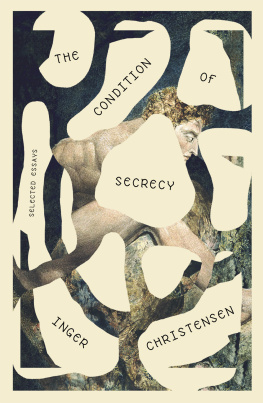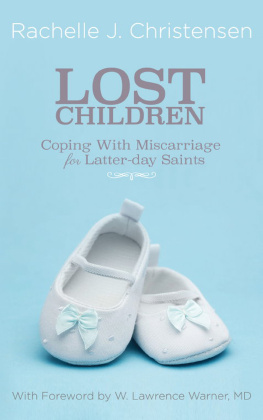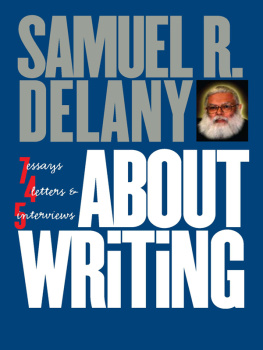The Condition of Secrecy
also by inger christensen
Alphabet
Azorno
Butterfly Valley
It
Light, Grass, and Letter in April
Copyright 1964, 1966, 1969, 1970, 1976, 1977, 1978, 1989, 1990, 1991, 1992, 1993, 1994 by Inger Christensen and Gyldendal Copenhagen
Copyright 2018 by Susanna Nied
All rights reserved. Except for brief passages quoted in a newspaper, magazine, radio, television, or website review, no part of this book may be reproduced in any form or by any means, electronic or mechanical, including photocopying and recording, or by any information storage and retrieval system, without permission in writing from the Publisher.
Th e Condition of Secrecy was published with the assistance of a translation subvention from the Danish Arts Foundation.
Excerpts from: Elias Canetti, The Torch in My Ear, tr. Joachim Neugroschel (Farrar, Straus & Giroux); Inger Christensen, The Painted Room, tr. Denise Newman (Harvill); Leonardo da Vinci, The Notebooks of Leonardo da Vinci, Vol. 1, ed. and tr. Jean-Paul Richter (Dover Publications); Gunnar Ekelf, En rst: efterlmnade dikter och anteckningar (Albert Bonniers Frlag); Benoit Mandelbrot, The Fractal Geometry of Nature (W. H. Freeman & Co.); Maurice Merleau-Ponty, The Merleau-Ponty Reader, ed. Ted Toadvine & Leonard Lawlor (Northwestern Univ. Press); Jacques Monod, Chance and Necessity, tr. Austryn Wainhouse (Alfred A. Knopf); Novalis, The Novices of Sais, tr. Ralph Manheim (Curt Valentin); Novalis, Philosophical Writings, ed. and tr. Margaret Stoljar (SUNY Press).
William Blake, Newton (p. 104), copyright 2018 by Tate, London.
Th e poster on p. 138 was photographed by Anders Sune Berg.
First published as a New Directions Paperbook Original (ndp1430) in 2018
Manufactured in the United States of America
Design by Erik Rieselbach
Library of Congress Cataloging-in-Publication Data
Names: Christensen, Inger, 19352009 author. | Nied, Susanna, translator.
Title: Th e condition of secrecy : essays / Inger Christensen ; translated by Susanna Nied.
Other titles: Hemmelighedstilstanden. English
Description: New York : New Directions, 2018. | Includes bibliographical references and index.
Identifiers: LCCN 2018021516 (print) | LCCN 2018025539 (ebook) | ISBN 9780811228121 (ebook) | ISBN 9780811228114 (alk. paper)
Classification: LCC PT8176.13.H727 (ebook) | LCC PT8176.13.H727 H4613 2018 (print) | DDC 839.814/74dc23
LC record available at https://lccn.loc.gov/2018021516
New Directions Books are published for James Laughlin
by New Directions Publishing Corporation
80 Eighth Avenue, New York 10011
The Condition of Secrecy
Freedom, Equality, and Fraternity
in the Summer Cottage
W here are you going for summer vacation? Today, were likely to answer with place names that give off a powerful warmth of their own, names of true summer lands by the Mediterranean. But back then between 1939 and 49 we were usually going either no place or maybe over to the summer cottage. Th e first answer meant that wed stay home in Vejle, where we lived in an ordinary apartment on an ordinary street; the other meant that when my fathers vacation came up, wed move a little way out of town, to the south side of Vejle Fjord near Munkebjerg, where the Tailors Union owned a cottage.
It was at home or in Th e Tailors House that the word summer gained meaning for me and grew full of the experiences that Ive later used to top up all other summers to extra fullness: summer as a morass of luxuriance. Yet at that time I tended to see it as having a lack of experiences especially during a summer when we didnt go over to the summer cottage.
Th e reason we said over to the summer cottage instead of out to the summer cottage must have had to do with its placement on a high hill actually tremendously high, when we had to push our loaded bicycles up but on the other hand it provided the satisfaction of being called Blaze Mountain, a name that gave off the powerful warmth of a true summer land.
And that warmth is probably the most powerful summer experience, the feeling of warmth filling your body so completely that theres no difference, no perceptible boundary, between the air and your skin. When it gets to that point, someone always says, Today its summer, with extra emphasis on -day, meaning both Summer is finally here and Tomorrow it will all be over. You sink down into a chair or the grass, in either shade or sun, with that sudden and afterward enduring feeling of warmth throughout your body the scent and the heat blended in a relationship that lends immediacy, or the possibility of immediacy, to all hot, muggy, sultry, scorching, etc. experiences.
In the same way theres a whole string of glimpses, images, moments of awareness, when summer became apparent and instilled itself in us: the path behind the gasworks, where black pieces of coke crunched underfoot and where there was always a multitude of yellow slugs on the sunny side, moving like slow flames that was on the way out to the garden by the cove, where the earth got so dry it cracked, and where we were always making finds because there had once been a trash dump; sometimes the earth was so hard and gray-white that you could scratch it like the shards of porcelain we found or that evening when, wending our way back to the cottage, we learned the phrase still as glass. Or that evening... or that evening. Today its summer, wed say then. Black coke, porcelain, and a sea shining like glass.
But in that string of warm summer images, some experiences stand out especially. Im thinking of three: a wide meadow deep with the pink wildflowers called ladys smocks, a noontime that I spent bouncing my big beach ball against the glowing wall of the house, and a night when a thunderstorm came up, and we gathered in the kitchen and ate strawberries.
Th eyre three banal experiences, nothing out of the ordinary; many people must have seen and done the same things, but for me they stand out. Th ey were for many years almost supernatural, are still nearly indescribable, and I know by now that I have to let them stay beyond words, because theyre about a childs a human beings in this case, my own first aesthetic experiences. Even back when they first happened, these three images were already what I can now call them: three images open, endless beauty; pointless energy; and the security of not being alone.
If we could just go over to the summer cottage, then summer was saved. Th en we had a real summer land to conquer. And we had a house. Although it belonged to us only because it belonged to others, I dont think that mattered much to us maybe we preferred to ignore it and over the long term, it worked its way in and became, to say it dramatically, an image of freedom, equality, and fraternity. Th e solidarity of the union members volunteer work on the house and yard on Sundays was striking because it was so unremarkable at least to us children, it seemed unremarkable, something we never thought about; it was simply all of us working together, pruning trees, making steps out of railroad ties, picking apples, painting garden furniture, spreading gravel, lowering the little pier into the water, having coffee and snacks, playing ball, raising the flag, singing, and swinging in the swing hung from the August apple tree. Now, much later, I know there were some members who didnt participate, and Im sure there was some muttering about them. Th ats part of the adult world. (Besides, this must have been wartime, but we didnt notice the war during the summer; it belonged to the basement back on our street at home, where rows of benches were set up in an underground shelter, it was basically only there that we belonged to the war, especially at night, especially during winter; it was absolutely a winter experience; even if we were home all summer, we didnt notice the war. During the summer, we forgot so fast.)















